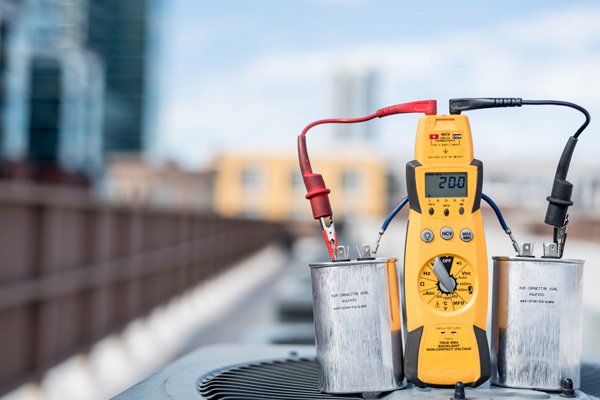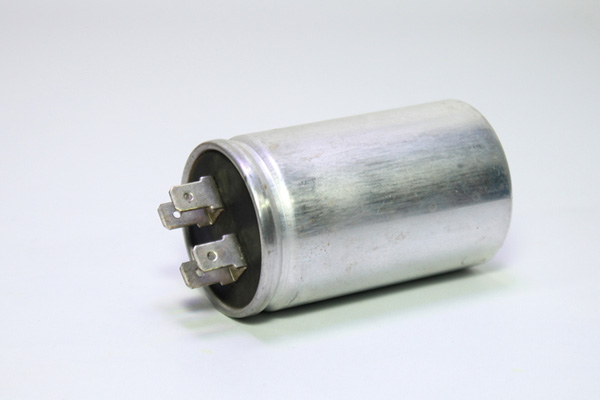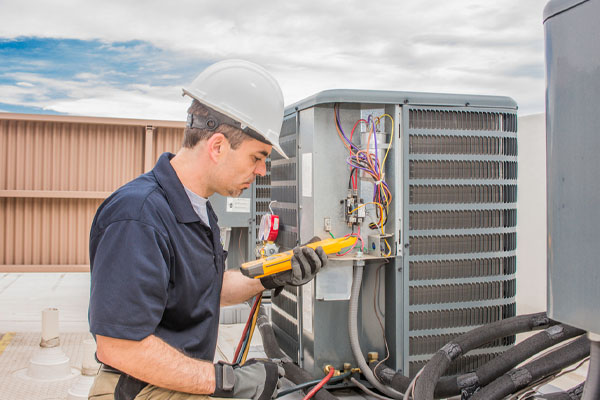
Air conditioner capacitors are vital for the efficient operation of your AC system. Despite their small size, these electrical components significantly impact your unit’s overall performance. Homeowners and HVAC enthusiasts must understand the role, function, and importance of AC capacitors.
In this article, we will tackle the significance of air conditioner capacitors. We will discuss the different types of capacitors, their functions, and their role in maintaining efficient cooling in your home. We will highlight common signs that indicate capacitor issues. We will also how to properly address these problems for the longevity and optimal performance of your air conditioning system. By familiarizing yourself with capacitors, you will be better equipped to identify and resolve potential air conditioner capacitor-related issues.
Related Article: Why Is My AC Compressor Working But Not Cooling?
The Function of Air Conditioner Capacitors
Table of Contents
- 1 The Function of Air Conditioner Capacitors
- 2 Call Skylands Energy Service For All Of Your HVAC Requirements
An air conditioner capacitor is a cleverly designed device comprising two metal conductors separated by an insulating material. In the context of air conditioners, capacitors are commonly seen as large, cylindrical batteries with two or three posts on the top.
The AC capacitor powers the motors of the air conditioning system, enabling it to cool your home effectively. It tends to malfunction or fail over time, so that it may require replacement as it ages.
When the capacitor ceases to function correctly, it can disrupt the entire operation of your HVAC system. This can lead to inadequate circulation of cool air. In turn, it will result in increased strain on the unit and potentially higher energy costs. Understanding the significance of the capacitor empowers you to address any issues promptly. This will ensure efficient cooling and prevent unnecessary expenses.
Related Article: Why Are My Lights Flickering When My AC Turns On?
Why Is An AC Capacitor Important?

The primary role of a cooling system’s capacitor is to store and release electrical energy that powers the motors. It enables the proper functioning of the AC unit. When the cooling system is activated, the capacitor delivers a surge of electricity to initiate the motors. It allows them to spin and operate the compressor and fan. It serves as a temporary power source, providing the required energy for the initial startup of the motors.
Without the capacitor, the air conditioner motors would struggle or fail to start. A malfunctioning or defective capacitor can cause issues such as:
- The air conditioning failing to turn on
- Weak airflow
- The compressor repeatedly cycles on and off
- The complete breakdown of the air conditioning system
Ensuring the proper functioning of the capacitor is crucial for maintaining the overall performance and efficiency of the cooling system. Regular HVAC maintenance and timely replacement of capacitors can help prevent potential breakdowns and maintain optimal cooling performance.
Why Air Conditioner Capacitors Fail Or Malfunction

AC capacitors can fail or malfunction due to various factors. Some common causes include:
- Age and Wear: Capacitors naturally deteriorate over time. They lose their ability to hold a charge. Internal components can degrade, leading to reduced capacitance and eventual failure.
- Overheating: While capacitors are designed to withstand heat during normal operation, excessive heat can accelerate their degradation. High temperatures can cause breakdowns in internal components and insulation, leading to capacitor failure.
- Voltage Fluctuations: Rapid changes in voltage or power surges can stress capacitors, causing them to fail. Electrical spikes, lightning strikes, or power outages can disrupt normal function.
- Manufacturing Defects: In some cases, capacitors may have manufacturing defects that make them more prone to premature failure. These defects can stem from poor-quality materials, improper assembly, or inadequate testing during the manufacturing process.
- Excessive Electrical Load: Heavy electrical loads can strain the capacitors causing them to fail. This includes running for extended periods or operating in extreme weather conditions.
- Environmental Factors: Harsh environmental conditions like exposure to moisture, humidity, dust, or corrosive chemicals can impact capacitor performance and lifespan. These factors can contribute to corrosion, insulation breakdown, or short circuits.
Regular maintenance, including inspections and testing of capacitors, can help identify potential issues before they result in complete failure. Signs such as bulging, leaking, or burnt smell indicate malfunction. These should prompt immediate replacement to prevent further damage to the AC system.
Related Article: What is a High-Velocity Mini Duct Air Conditioning System?
Signs Of A Faulty Cooling System Capacitor
Be vigilant for the following indicators of a faulty capacitor:
- Weak or No Cold Air: If your air conditioner blows warm or weak airflow instead of cold air, it may be a sign of a defective capacitor. The capacitor power the motors responsible for the cooling process. A malfunctioning capacitor can result in inadequate cooling.
- Difficulting Starting: A failing capacitor can cause your air conditioner to struggle when starting up. You may notice that it takes longer than usual for the system to kick in or repeatedly attempts to start but fails to do so.
- Frequent Air Conditioner Cycling: A capacitor nearing failure can cause your air conditioning unit to cycle on and off more frequently than usual. This rapid cycling can stress the system more and increase wear and tear.
- Buzzing or Humming Sounds: Unusual noises, such as buzzing or humming emanating from your AC, indicate a capacitor problem. Faulty capacitors can generate electrical disturbances that manifest as peculiar sounds.
- Capacitor Bulging or Leaking: Physical signs of a problematic capacitor include bulging or swelling of its cylindrical body. The capacitor may leak oil or exhibit charring or burning marks in severe cases. These vital indications suggest a damaged or compromised capacitor that requires immediate replacement.
- Tripped Breaker: A malfunctioning capacitor can cause excessive electrical currents, resulting in a tripped circuit breaker. If your air conditioner repeatedly causes the breaker to trip, inspect the capacitor to check if it is the source of the issue.
Being attentive to these warning signs can help you identify a faulty AC capacitor and take proactive action. Seek professional assistance in replacing the capacitor as needed.
Related Article: Why Your Outside AC Unit Keeps Tripping The Breaker
Do Not DIY – Call A Professional HVAC Contractor
When your capacitor fails or malfunctions, do not DIY. Call a professional HVAC contractor instead. Here are several reasons why:
Safety
Handling electrical components can be hazardous. If you lack the essential knowledge, training, and experience, don’t even try. Capacitors store electrical energy even when the power is disconnected. Improper handling can result in electrical shocks and other injuries. HVAC professionals have the necessary training and expertise to handle these components safely. Certified HVAC technicians can take the proper precautions to mitigate risks and protect your safety.
Related Article: 10 Reasons Why Your AC Unit Isn’t Blowing Cool Air
Proper Diagnosis
Although a faulty capacitor is a potential cause of air conditioner problems, one must recognize that other underlying issues may be at play. HVAC technicians have the expertise to conduct a thorough diagnosis. They can determine whether the capacitor is indeed the main culprit or if additional factors contribute to the malfunction. Their knowledge and experience enable them to identify and address all relevant issues. Professionals can provide a comprehensive and effective solution to restore the proper functioning of your air conditioning unit.
Related Article: Tell-Tale Signs of An Overcharged Air Conditioner
Correct Capacitor Replacement
Capacitors vary in size, voltage ratings, and capacitance values. This is why it is vital to select the appropriate one to avoid damaging your HVAC system. HVAC professionals have the expertise to identify the correct capacitor for your specific system and ensure proper installation. By relying on their knowledge and experience, you can prevent potential complications. You are assured that the right capacitor is installed, optimizing the performance and longevity of your cooling system.
HVAC Warranty Considerations
If your air conditioning unit is covered by a warranty, attempting to repair or replace components yourself can void it. Professional technicians have the necessary certifications and the knowledge required to perform repairs without jeopardizing warranty coverage. By relying on their expertise, you are guaranteed that any repairs or component replacements are conducted in compliance with warranty terms. This will safeguard your warranty coverage.
Related Article: Smoke Coming From Vents When AC Is On
Efficiency & Performance
AC systems are intricate and have multiple components that work together to deliver optimal cooling performance. Engaging the services of a professional technician allows for a comprehensive assessment of the entire system, not just the capacitor. Examining all the components, a technician can ensure that each part functions correctly and harmoniously. This approach optimizes the system’s efficiency, cooling capacity, and overall performance, resulting in a well-functioning air conditioner that meets your comfort needs.
Conclusion
Enlisting the services of a professional HVAC technician’s services ensures that the AC capacitor’s repair or replacement is conducted safely, accurately, and with consideration for the entire system. This safeguards your investment, preserves warranty coverage, and guarantees your air conditioning system’s efficient and dependable operation. Relying on the expertise of a professional gives you peace of mind knowing that your air conditioner is in capable hands and will continue to provide optimal cooling performance.
Related Article: Why Is My Air Conditioner Running In Short Bursts?
Call Skylands Energy Service For All Of Your HVAC Requirements

Skylands Energy Service offers superior heating and cooling services in Central New Jersey. We hire only certified technicians who can provide you with high-quality HVAC tune-ups, repairs, installations, and replacements. Each of our professional technicians has the knowledge and experience to service your HVAC system correctly.
Skylands Energy Service guarantees the most cost-effective and competitive HVAC service costs in the region. Our maintenance services are designed to improve comfort and increase energy efficiency while reducing your home’s HVAC costs. If you need an HVAC repair or replacement, we can recommend the best solution for your home while staying within your budget. We back all our HVAC work with a satisfaction guarantee for your peace of mind. To schedule a service appointment, give Skylands Energy Service a call today.
Contact us now at (908) 707-1776 to find out more! Click the link to view our service area.

